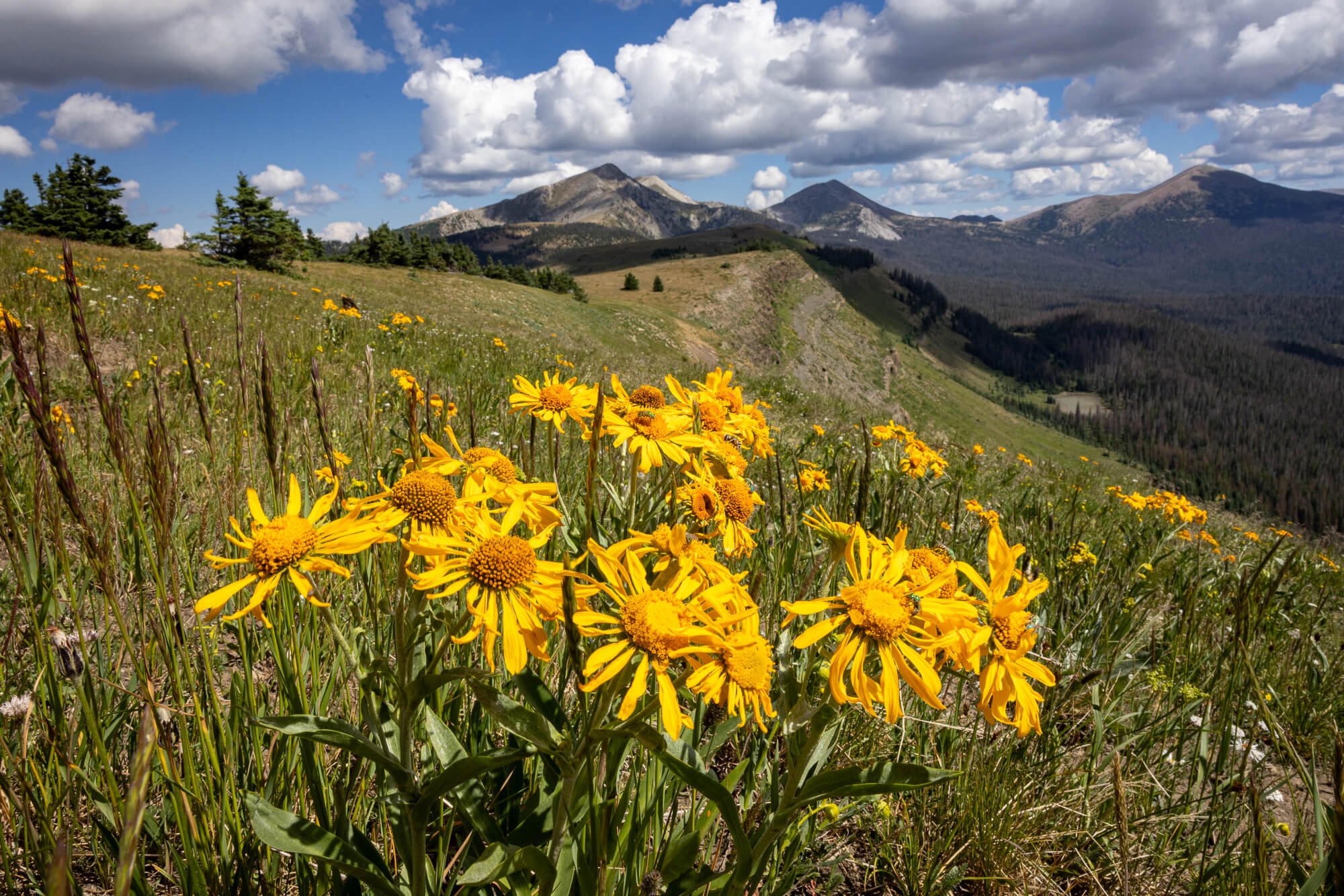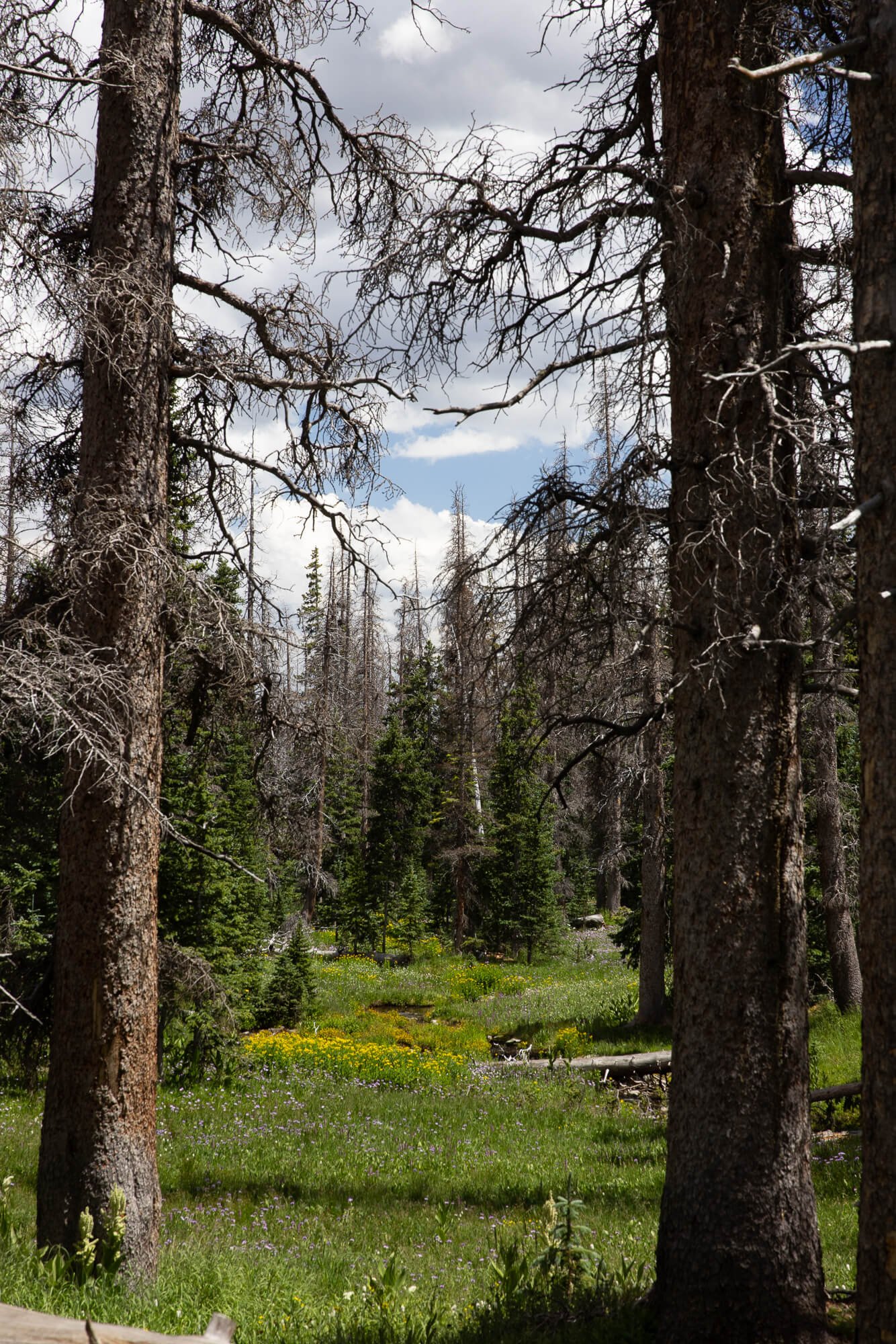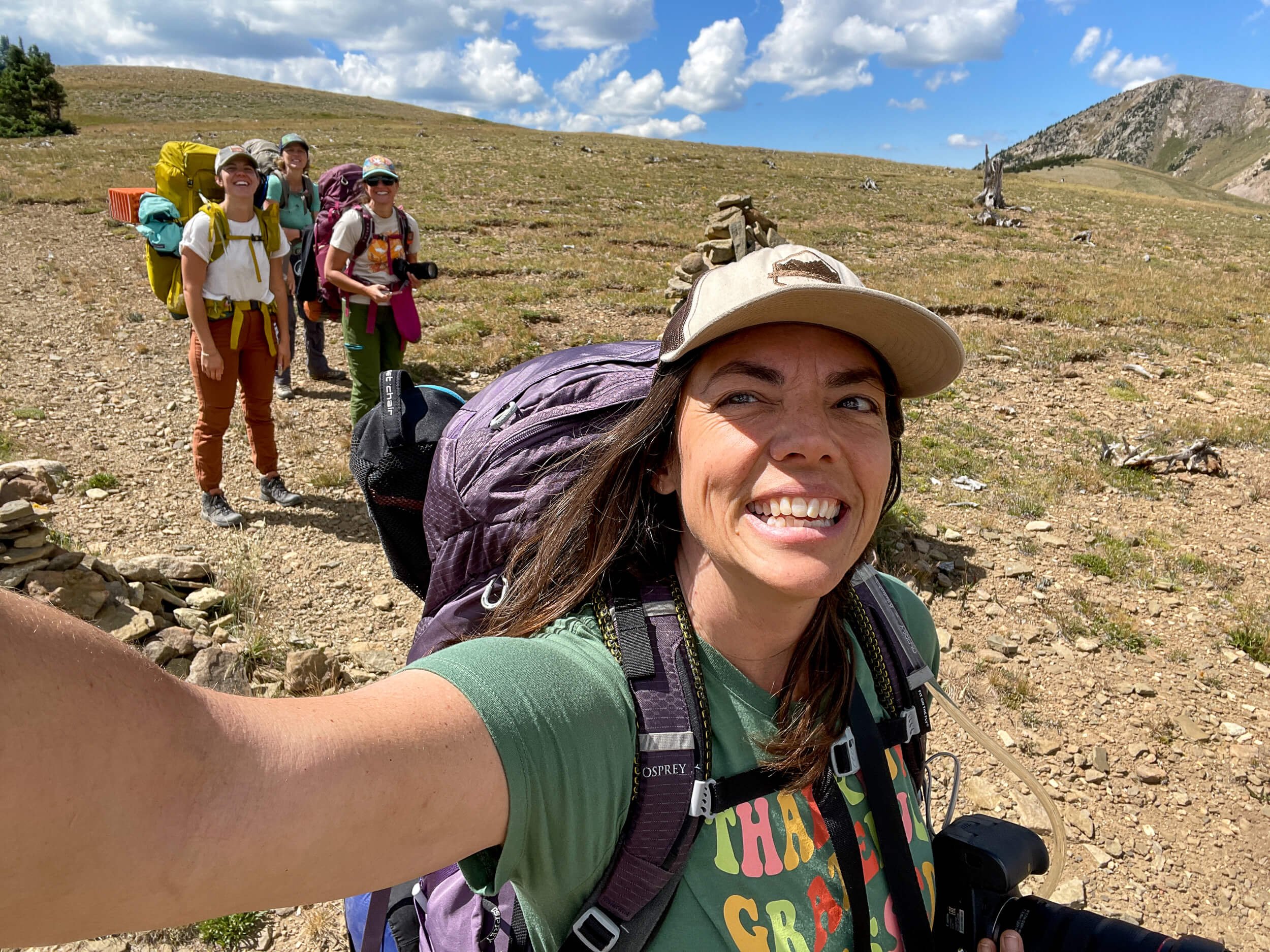Honoring Grief: Loss and Change in My Beloved Here
On a bluebird sky week in early August, I backpacked across the Pecos wilderness with a few friends. We started on the south end of the wilderness and made our way across to the north side along the Skyline Trail, walking 28 miles over 3 nights and 4 days. We camped next to alpine lakes, ogled over mixed conifer forests full of wildflowers, smiled at double rainbows, whooped and whistled at eternal mountain peaks, furrowed our brows at big views of dead trees, filtered water from alpine springs and streams, ate too much dehydrated food, and laid in meadows to watch golden light fade from mountain peaks as sunset transitioned into twilight. We rarely passed anyone else on the trails. It was blissful.
The most notable and surprising part of the trip for me, however, was the day after I returned home. After I laid my heavy backpack down, I got a good night’s rest. That night I dreamed of trees and forests, and a dawn sky that rather ominously kept turning from purple to red. I woke up that Saturday feeling moody, irritable, emotionally exhausted, and ready to fight anyone whose tone was just a little bit unappealing to me. For most of the day, my husband and children side stepped me, giving generous space to my mood. I was perplexed. I couldn’t figure out why I was feeling the way I was. When I returned from my spring backpacking trip to the Grand Canyon, I spent the first week back in a state of slow-moving bliss, aikido-ing any challenge that came my way with ease, basking in the glory of a week spent in the wilderness, unplugged. Why was it so different this time? I would come to understand it was because the Grand Canyon wasn’t home.
That Saturday evening as I sat down at a long table with some companions at a gathering, I realized what was going on with me. I was grieving. Hard.
Devastating scenes from the trip floated through my head: Views from the mountain ridges of acres and acres of dead standing trees; The shores of a mountain lake in the wilderness trampled and soiled by cattle; Towering Engelmann spruce so riddled with boring beetle holes that they had lost their life force; Once lush moss-covered ground turned brown and desiccated; Sun-scorched mountain tops radiating with heat; Wildflowers above tree line dried up too early as they hadn’t seen rain in weeks.
Along the way, my friends and I occasionally commented about the sad state of the forests. It was hard to ignore. But try to ignore it, I did. On the trip, I was busy walking long distances, collecting water, feeding myself, carrying a heavy backpack, getting what sleep I could on the hard ground, and reserving some energy for dinner circle conversations. All that was work enough. To sink into the largeness of the devastation that I was also witnessing, to let myself acknowledge it too deeply in the moment was potentially dangerous. I stayed mostly in a state of denial during the trip. And truth be told, alongside the dead forests, there was also a lot of beauty to revel in and feel happy about: meadows of wildflowers, rainbows, crystalline alpine lakes, wildlife to admire, and friends to get to know more deeply. Nature, through its changes, keeps giving this gift of beauty.
But, now that I was home with the physical burden of the heavy pack removed and the conveniences of life returned, I realized I was trying to hold back a wave of rage and underneath that, mourning, that was threatening to drown me. And so I let it go. I excused myself from the table and stepped out into the warm summer night with a sky full of twinkling stars. Under Venus in retrograde, who invites reflection and change in our lives, I cried my eyes out. I cried through the rage and anger I felt towards humanity’s lack of care, I cried through the pain of loss of something I love so dearly, I cried through the guilt at my part in it all, I cried for the suffering that this planet’s creatures and people will continue endure due to our lack of humility and enoughness, I cried in rage for all those who still single-mindedly pursue materialism, I cried for my kids’ future, and I cried out the exhaustion I felt at the thought of the long road ahead of us to get back into balance with Nature.
I’d felt this type of grief before in my life, what some call “ecological grief,” but it had never felt quite so personal to me. This time, the feeling was as strong as when I lost close family members. For years, I have accessed this wilderness a short drive plus a few steep steps from my home. On my map, I’ve traced the trails I’ve walked, the number of highlighted lines marking where I’ve been, growing each year. I’ve kept lists of the wildflowers and bloom times along the trails and noted their movement. I’ve made friends with individual wild orchids and wood nymphs (a flower), greeting them anew after each winter. I’ve snowshoed the mountain peaks, napped on downed logs as dappled light filtering through the leaves on the trees played on the backs of my eyelids. I’ve walked off a lot of steam from the challenges of human relationships in these mountains and forests and been soothed by the Hermit Thrush’s song on the high altitude trails. I’ve staked out mountain springs to photograph wildlife and understand their natures. I’ve slept under shooting stars, the milky way’s core, and full and new moons. It was here that I had felt the fullness and peace of the universe. I’ve taken refuge here. Basked in the beauty of this familiar forest, here. And at some moment that I can’t exactly pinpoint during the years, this place became home. My beloved Here.
The resonant impact, then, of thousands, if not millions, of dead spruce and fir trees on the east side of the Truchas Peaks, hit me hard. This is here. In my beloved place. In my home. Not some abstract melting glaciers and ice caps I’ve never seen. Not some tragic tsunami flooding across the world where I’ve never been. It’s right here, under my feet. I’ve grown up as an adult here. I’ve become who I am today because of my time spent in these forests and mountains. Over 20 years, I’ve dedicated myself to understanding and sharing the stories of this place, participated in the changing seasons, falling in love with it, and, yes, witnessed the changes wrought by a changing climate. It is happening in my home. My beloved Here.
My rational side knows that all is not lost. I know that many people are working on this problem and I have faith that eventually we will figure out how to live on this planet with out causing so much destruction to Nature (and each other). Probably not in this lifetime, but maybe in one of my future lifetimes, things will be getting better. I know that Nature is incredibly resilient and has a mystical ability, beyond our comprehension, to adapt (see this story about Zebra Finches for proof). I know that all will not be lost. I know that even though my beloved landscapes may change to a point beyond my recognition, Nature will always remain. Only arrogance would think otherwise. There is and will be beauty, even in the broken. My head knows all this. But, the grief in my heart growing from losing something I love, must be acknowledged and dealt with. It must be felt and processed if I am to survive it.
For a few days after the backpack trip, this grief felt isolating. I couldn’t see how anyone around me could possibly understand what I was feeling and why I was feeling it. That unhelpful thought made me mad and sad. It’s a type of thought whose only purpose is to isolate me from others. Part of me knew it wasn’t true, but I was reluctant to bring it up as I couldn’t take anyone belittling the feelings I was having, or brushing it off, as we so often brush off our impact on Nature.
Aldo Leopold’s words from Sand County Almanac played on repeat through my head.
“One of the penalties of an ecological education is that one lives alone in a world of wounds. Much of the damage inflicted on land is quite invisible to laymen. An ecologist must either harden his shell and make believe that the consequences of science are none of his business, or he must be the doctor who sees the marks of death in a community that believes itself well and does not want to be told otherwise.”
The fact is, its not just those of us with an ecological education, anymore, that feel grief for what’s happening. Many of us feel this pain of loss. Maybe not most of us, yet, but many of us. It’s become part and parcel to being alive in this moment on this planet. The signs of the illness in our Beloved Here are unignorable now.
After I acknowledged my feelings and had a good long cry, I talked with my husband about what I was going through. Sharing with someone who I knew wouldn’t think I was crazy, was relieving. And he was relieved to know the reason for my mood.
Scientists, conservation photographers, conservationists, environmental writers and journalists who I encounter in my professional life, all of who are on the front line witnessing and in the business of documenting decline, speak of their feelings of grief more openly these days and are working out how to deal with it. I leave you with a few helpful ideas that I’ve picked up from conversations with these souls who are in the thick of it most of their days.
We can work through the grief. And we must, so that we can continue to take the steps needed to get ourselves and our beloveds out of this mess we’ve made. To continue living in and enjoying our home places, we must work with the grief and beauty, side by side.
LIVING WITH ECOLOGICAL GRIEF
Acknowledge the grief. Once we realize what we are feeling, we can move through it an allow it to make us stronger.
Keep moving through the feelings of grief when you notice them. This is a slow, cumulative grief that may endure for the entirety of our lifetime. Give yourself time and space to let it out. Keeping the feelings bottled up will only make it harder to endure. As one scientists said: “There’s a power and an honor to grief, because it means that we have loved something, and we’ve had a connection to a place or to species of the planet. We need to find ways to mark our loss and share our loss, but also to remind ourselves that we only grieve what we love. I think new rituals are essential to celebrate that love, and to mark the loss and to come together for loss.”
Sharing our stories with each other helps move through the grief and rebuilds our strength to continue on with our small part in turning the tide.
Play your part. Do as much as you can to feel well about the contribution you are making towards the solutions that already exist. But don’t burn yourself out. That will only make the grief, and your ability to revel in the beauty, harder. Live your life and enjoy it too.
Make art. The creative process can be a distraction and also a way to process what we are feeling. Hands-on, tactile types of art where I come away with a something I can touch (that’s to say, not digital) and incorporates bits of nature is especially helpful for me in this way.
Foster a love of the natural world in the next generation, its critical for them to be part of the solution.
Find beauty in the changes. It won’t be the same, but it will still be Nature.
Listen to happy music. Dance it out. Bop along on the trails to that silly pop song refrain stuck in your head. Nothing like a good beat to help you keep those emotions in motion.
Revel in all the beauty that remains. Seek it out. Relate. Spend time with it. Come to know it enough to fall in love with it. Live in the joy of it. Make friends with Nature. Honor it. Be humble before it. Seek enoughness. Let it fill you up again. Get out there.


























